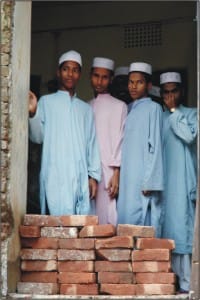Utilising the services of imams

Amirul Rajiv
The national imam conference was held on November 5. It was jointly organised by the Ministry of Religious Affairs, Islamic Foundation and UNFPA, which started a project in 1999 to train imams in various areas including nursing, child health, safe motherhood, bad effects of dowry and child marriage, gender equity, awareness against social crimes and terrorism, prevention of spread of HIV/AIDS and control of diarrhea.
The conference was opened by chief adviser who, inter alia, advised the imams to strengthen public opinion against criminals, women repressors, narcotics addicts, smugglers and dishonest businessmen.
The chief adviser praised the role of the imams and the ulema in resisting violence in the name of religion. He added that no nation could remain in isolation in the present-day world. Thus, they should pay more attention to modern knowledge to keep pace with the world.
This needs more work-oriented education along with religious and moral education. He called upon the imam community to play a leading role in fulfilling people's desire for achieving democracy to be led by upright, competent and honest people.
The UNFPA representative, while pointing to the importance of imams in playing the role of social/community leaders, advised them to play their part properly.
To train the imams an Imam Training Academy was established in 1979. It has been able to impart training to 60,000 imams of a total of 400,000. Imams are highly respected by the common people, particularly in certain areas of the northern part of Bangladesh and in some parts of greater Khulna and Jessore districts, where the activities of the Islami militant groups like JMB and Huji are greater than in other parts of the country.
Thus, by remaining more vigilant about the activities of these groups they can assist the government in its effort to root out militants in the country because they are in close touch with the rural mass.
Despite execution of some of the top leaders of JMB, and incarceration of large number of their followers, there may be resurgence of militant groups unless the people are alert and extend their cooperation to the government. Only the law enforcing agencies are not enough. In addition, the government may consider the following steps:
Modernising madrasa education: Madrasa teachers may be encouraged to study teachings of major religions so that they have a fair idea about these religions.
Increasing employment opportunities for the imams: Improvement of their financial situation will encourage them to participate in economic activities.
Generally speaking, the imams are respected by the people. They may, however, be advised to be extremely careful and tactful about issuing fatwas. They should take a positive stance on female education, women's participation in economic activities, in politics, and in social work. They should discourage women repression, and exacting of dowry from the parents of the brides.
With the spread of modern education and urbanization, the rural masses are changing rapidly. Even an illiterate villager desires to know more about religion. Since the imams hold influence over the rural people the government ought to try to utilise their services for smoother and faster development of the country. With 60,000 trained imams in the country, we may reasonably expect a significant assistance from them in establishing peace and harmony in the country.
Needless to say that threat of violence, corruption and population explosion are major impediments in our efforts for development. In improving these areas the imams can be great motivators because the common people listen to their advice with deep respect. No doubt, in our restless society, our imams can bring peace and stability.
A.B.M.S. Zahur is a former joint secretary.

 For all latest news, follow The Daily Star's Google News channel.
For all latest news, follow The Daily Star's Google News channel. 



Comments